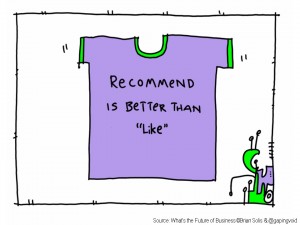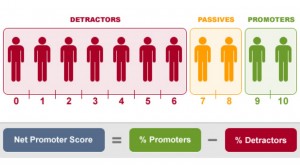The future of business will require new success metrics. Since the future of business has been established by Brian Solis as being about shared experiences with connected customers enabled by great technologies, the next logical question might be whether or not those same technologies afford the ability to get new success metrics. Perhaps, but let’s not go there so fast.
It’s clear that the digital nature of our lives is fueling big data, and both social media and search capabilities have changed the dynamics of communication. In this environment, we can measure clicks and conversions and even "likes" and "shares." From all those metrics, we can infer important details that help us understand the relative impact of our marketing. For even better insights, we have marketing analytics to inform our strategies and fine-tune our execution.

Those metrics are useful and certainly better than the days before the internet when the best we could do was “impressions” or response rates. But before we look at metrics, Brian suggests first that we stop and consider the bigger picture of what’s really going on. Measuring “likes” for instance? Meh. How about recommendations? Now THAT is more like it. And it’s not simply, “Would you recommend us?” but “Did you recommend us?” THAT is what a success metric looks like in a future of shared experiences.
Because a recommendation is always more valuable than a “like,” we should re-think what we measure and focus on shared experience value – what people are sharing and how well that aligns to the experience you want people to have and to share.
In the context of a basic net promoter evaluation, people are either advocating for you, or they’re your worst critic and Brian believes we can ignore the "passives" in the middle because they don't matter.
Consider Brian’s “Experience Divide” from the previous post on shared experiences that highlights the divergence between the brand promise and what people experience.
It’s worth measuring if it’s a positive gap for the customer, and it’s critical to measure if the gap falls short for the customer. We should ask, what experiences are people having and sharing and how can we fix that? Don’t look at ROI, but instead consider “Return on Experience” as the valid metric.
He believes the real value of how you improve your business starts with a purpose. It’s about what people are actually saying in between surveys because future of your brand isn’t created by your black turtleneck-clad brand police – it’s co-created with your customers whether you like it or not. And they are getting louder than you, no matter how clever your marketing is.
And here’s the rub – marketers should not see that as a threat – not at all. It’s an opportunity, which takes me to the fifth and final post in this series. Stay tuned for details about the big opportunities in Brian Solis' vision of the future.
Brian's vision of the future comes not from the use of a divining rod or even one of those nifty magic 8-balls, but from studying disruptive technologies and from his perspective as a self-described "aspiring digital anthropologist." In that role, he studies the impact of technologies on people, society and culture. Brian shared this vision of the future at the recent Integrated Marketing Week conference in New York City, where he appeared as a keynote speaker. More details about his vision of the future are available in his recently published book, What's The Future of Business. You can also view this short interview of Brian conducted by AllAnalytics on-site at the show.
And as always, thank you for following!

